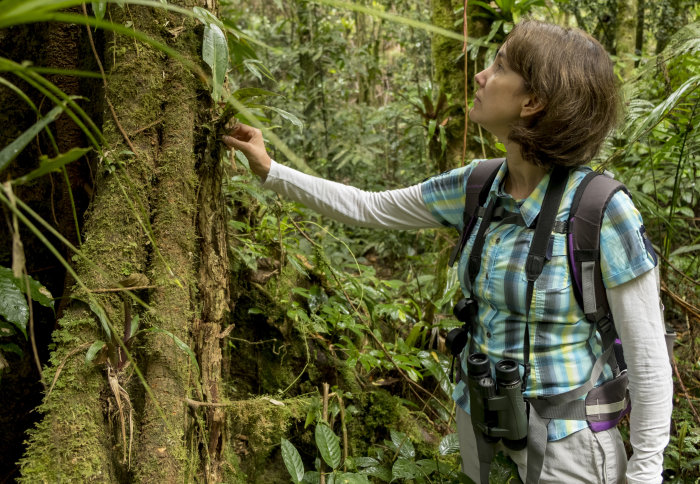Scientist bringing Brazil’s biodiversity back from the brink up for impact award

Imperial scientist Dr Cristina Banks-Leite has been shortlisted for a NERC Impact Award for her work preserving Brazil’s biodiversity.
The Natural Environment Research Council (NERC) Impact Awards celebrate the positive real-world impacts generated by UK environmental scientists.
Dr Banks-Leite, from the Department of Life Sciences at Imperial, has devoted her career to saving the forests of her homeland in São Paulo. Here, one of the most biodiverse areas in the world, the Atlantic Forest, has suffered great losses due to deforestation for agriculture in recent years.
The tropics are home to 75 percent of all species and 40 percent of human population, many of whom live in poverty. So we urgently need to find ways to combine biodiversity conservation with human welfare. Dr Cristina Banks-Leite
Her research has paved the way for the restoration of a fragile forest ecosystem, safeguarding the biodiversity of the region and providing vital water security for the farmers and residents of Brazil’s most populous state.
During her research, Dr Banks-Leite identified the minimum forest cover required to maintain biodiversity (30 percent), a threshold that has now been employed as the official target for restoration in the Atlantic Forest by the Brazilian Government. In 2017, this threshold was employed after she showed that it could be achieved at a cost of just 0.01 percent of Brazilian GDP.
The funds are to be spent on ‘payment for ecosystem services’ (PES) – a scheme which compensates farmers in key areas to restore or protect forested areas, helping both to alleviate poverty and support the environment.
Dr Banks-Leite is now looking to apply her methods to other key biodiversity hotspots around the world to develop forest cover thresholds suited to each unique biome.
Stemming an unprecedented rate of species extinction
In the video above by NERC, Dr Banks-Leite describes her work
Dr Banks-Leite said: “The planet is going through an unprecedented rate of species extinction, with profound consequences to humankind. The tropics are home to 75 percent of all species and 40 percent of human population, many of whom live in poverty. So we urgently need to find ways to combine biodiversity conservation with human welfare.
“We found that by maintaining 30 percent of forest cover within farmland in the Atlantic Forest of Brazil, we can preserve biodiversity and ecosystem integrity. Importantly, setting aside land for nature in priority areas would incur a loss of only 0.61 percent of the agricultural GDP in the region, but has the potential to alleviate poverty if set-asides are associated to payment for ecosystem services schemes.
“It is a very positive message that we do not need to make compromises between ecological gains and economic costs.”
"A viable solution to a problem that urgently needs addressing"
Dr Simon Kerley, Head of Terrestrial Ecosystems at NERC, said: “Brazil is the most biodiverse country in the world. Research like this is critical if we’re to tackle the high rates of extinction being seen globally today. The work of Dr Banks-Leite is important because it not only protects the uniquely rich biodiversity of Brazil, but also because it offers a viable solution to a problem that urgently needs addressing.”
By demonstrating the effects of habitat loss and fragmentation on biodiversity, and the relatively low costs of restoring sufficient habitat to protect forest species, Cristina’s science has shaped conservation and land management policies that will help to protect this critical biome. Professor Tim Barraclough
Professor Tim Barraclough, Deputy Head of Life Sciences at Imperial College London, said: “Few scientists can claim to have improved the lives of millions of people, but Cristina Banks-Leite is doing exactly that for people living in and around the Atlantic coastal forests of her native Brazil.
“By demonstrating the effects of habitat loss and fragmentation on biodiversity, and the relatively low costs of restoring sufficient habitat to protect forest species, Cristina’s science has shaped conservation and land management policies that will help to protect this critical biome.
“Restored forest cover and biodiversity will bring a wealth of ecosystem services and benefits to the people of the region, and may soon be rolled out to other regions. I am delighted that Cristina has been nominated for a NERC Impact Award in recognition of this work."
Dr Banks-Leite’s research has been shortlisted for the early career category of the 2018 NERC Impact Awards, the winners of which will be announced at a ceremony at the Natural History Museum on 3 December 2018.
-
Based on a press release by the Natural Environment Research Council.
Article supporters
Article text (excluding photos or graphics) © Imperial College London.
Photos and graphics subject to third party copyright used with permission or © Imperial College London.
Reporter
Hayley Dunning
Communications Division
